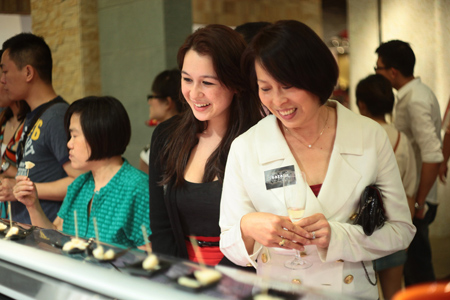Companies
Discovering a taste for upmarket food
By Xu Junqian (China Daily)
Updated: 2011-06-13 13:22
 |
Large Medium Small |
 |
|
Consumers taste zongzi (rice dumpling) and Champagne at the first Bazaar by Lotus in Shanghai. The retailer provides more than 7,000 products, of which 70 percent are imported, at its 3,200-square-meter venue. [Photo / China Daily] |
High-end supermarkets specialize in imported and organic products
SHANGHAI - Mercedes-Benz, BMW and Rolls Royce cars are frequent sights on Shanghai streets. Opulent shopping malls in the city's center are home to many exclusive fashion brands, such as LV, Prada and Ferragamo.
Now the latest addition to these symbols of prosperity are high-end supermarkets that specialize in imported and organic food - the craze among the urban elite.
These new stores, all owned and operated by foreign retail chains, have rapidly gained popularity not only among expatriates in Shanghai, but also among locals, especially the young and rich, who have been worried by a spate of food scandals.
Chia Tai, the business arm of Thailand's Charoen Pokphand Group (CP) in China, is the latest entry into the market.
Recently, the owner of CP Lotus and Super Brand Mall announced the launch of its first upmarket food retail brand, Bazaar by Lotus, in Shanghai's Xintiandi, the fashion hub and one of the most famous locations in the city.
The retailer provides more than 7,000 products, of which 70 percent are imported, at its 3,200-square-meter venue decorated in the style of the lively and colorful open markets found in the Middle East.
Here, customers are invited to take a sip of a cocktail, sake or beer served by a bartender in the alcoholic beverages section or book a bespoke birthday party in the central lobby.
"We are always looking for a new opportunity and a new concept to enrich our business structure," said Kunioka Michio, senior vice-president, marketing, at CP. "Bazaar by Lotus does not only offer a complete range of international gourmet foods but is also an ideal destination for urban dwellers to meet and play."
What Thailand's biggest conglomerate calls "new" is, however, the latest trend in the industry, especially for retail giants from Hong Kong, where the high-end supermarket industry has been flourishing for decades.
Last August, China Resources Vanguard, one of the largest supermarket chains in China, opened its first upmarket store, Ole, in Shanghai. It is planning to increase the number of its stores in the city to four or even six over the next five years.
City Super, one of the most famous high-end supermarket brands from Hong Kong, also unveiled its first store on the Chinese mainland in Shanghai in June 2010.
Unlike most ordinary supermarkets on the mainland, these new stores all boast a hip and subdued style. The lighting is soft and the background music is decidedly classical. The goods are neatly arranged on the shelves and the wooden floors are clean and well polished. Customers are spared from intrusive sales people who push everything from processed milk to vacuum cleaners. Most of the products are comparatively expensive and not easily found in other stores.
| ||||
It is too early to measure the size of the return. The Taste, a subsidiary high-end supermarket brand from Hutchison Whampoa, controlled by Li Ka-shing, Hong Kong's richest man, has not been regarded a success after opening in Shanghai in 2004, despite generous support from headquarters and its well-established reputation in Hong Kong.
Sun Yuanxin, commercial economy specialist at the Shanghai University of Finance and Economics, said that although there are many well-to-do people in the city, the number is still small compared with the population in general. Furthermore, the upmarket food sector is still in its infancy in China.
| 分享按鈕 |



